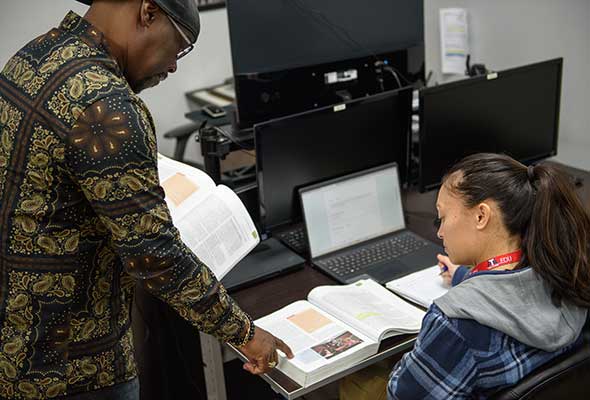- Career College serving San Diego County
Find your passion and learn great skills with ATA’s Criminal Justice diploma program. We offer an immersive 9-month curriculum near San Diego and El Cojan, CA.
Get your career in criminal justice off the ground with a diploma from ATA College. Our 9-month program is designed to give you the tools you need to succeed. Learn more and start Today!
Hands-on training by industry experts.
Study from home, the office, or anywhere you can find an internet connection.
Train For a Career in Criminal Justice In 9 Months, 40 Semester Credits / 36 Weeks.
Train To Enter State, Local, Federal Law Enforcement.
ATA College works to provide career training programs for entry-level positions in specialized fields like criminal justice.

ATA College's diploma program in criminal justice will help you launch your career and find success. Learn the skills and knowledge to become qualified for employment opportunities.
40 Semester Credits / 36 Weeks
Financial Aid Available For Those Who Qualify.
ATA College is approved by the California State Approving Agency to enroll veterans and other eligible persons who qualify for VA Benefits.
ATA College is proud to present an accelerated 9-month diploma program for criminal justice in El Cajon, San Diego California.
The Associate of Science is available in four emphasis areas and builds upon the Criminal Justice & Public Safety program. Students are required to choose one emphasis path in:
Are you considering a career in Criminal Justice? Look no further than ATA College, located in the beautiful city of El Cajon in San Diego. Our Criminal Justice program offers training to prepare you for a successful career in this exciting field.
Discover the world of criminal justice through our program! Our program provides education on the justice system and equips you with the tools necessary to pursue a career in this field. Learn about the various branches of the industry and gain practical skills that will prepare you for a successful future. Join us and explore this exciting and rewarding field!
ATA College in El Cajon, San Diego, offers criminal justice training that equips students with the necessary skills to enter into a career within the criminal justice system. ATA College provides informative training to students keen on pursuing a career in law enforcement, corrections, or other criminal justice-related areas. The college’s instruction imparts essential knowledge, practical skills, and techniques relevant to the field of criminal justice.
Students can develop critical thinking, problem-solving, and decision-making abilities essential in their future careers. With ATA College’s criminal justice training, students can acquire the knowledge and experience necessary to make a positive difference in their communities.
After completing the 9-month Criminal Justice and Public Safety diploma program at ATA College, students can continue with courses in the Associate of Science program. The Associate of Science in Criminal Justice is available in multiple emphasis pathways and can be completed in an additional six months.
Upon graduation, you can work in homeland security, corrections, corporate security. ATA College has an Educational Alliance with Grand Canyon University for students completing this associate degree program successfully. ATA College Graduates can transfer their credits and receive a 10% off Scholarship towards GCU tuition.
The job outlook for the criminal justice field is optimistic, with a projected growth rate of 5% from 2019 to 2029. This growth rate is slightly higher than the average for all occupations, indicating a strong demand for individuals trained in law enforcement, corrections, and criminal investigation.
Of course, job opportunities will vary by specialty and location, but overall, the future looks bright for those interested in pursuing a career in this rewarding and challenging field.
If you’re excited about criminal justice, let’s talk careers! The criminal justice field is full of opportunities for growth and success, whether you’re interested in policing, investigations, law, corrections, or even a federal agency. Ready to take the first step? Consider ATA College’s Associate of Science in Criminal Justice training. Find out how it can help you achieve your professional goals today!
Looking to start a new career? ATA College is here to support you every step of the way. Discover our exciting career options and take the first step to unlock your potential today. Get in touch with us now for more information!

Discover the advantages of our programs, the exciting coursework you’ll undertake, and everything needed to apply!
Copyright © 2026 – ATA College, All rights reserved.